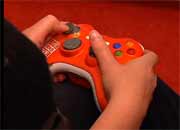
FRIDAY, Sept. 14 (HealthDay News) — Teens who play video games that glorify risk may be more likely to become reckless drivers, a new study suggests.
Researchers say these teens have more car accidents and moving violations, and are more willing to drink and drive.
The study was published online recently in the journal Psychology of Popular Media Culture.
The researchers conducted a series of four phone interviews with more than 5,000 U.S teens over the course of four years.
Taking the teens’ gender, age, race, household income, education and parents into account, the researchers asked them to rate their levels of sensation seeking and rebelliousness.
Half of the teens said in their initial interview that they were allowed to play mature-rated games. Of those teens, 32 percent said they had played “Spider-Man 2,” while 12 percent had played “Manhunt” and 58 percent had played “Grand Theft Auto III.”
“Spider-Man 2” is rated “Teen” by the Entertainment Software Rating Board, while “Manhunt” and “Grand Theft Auto III” are rated “Mature.”
These games are linked to greater sensation seeking and rebelliousness, the researchers said, which are in turn related to self-reported risky driving, car accidents, traffic stops and a willingness by the teens to drink and drive.
By the third of the four interviews — when participants were roughly 16 years old — 21 percent of teens said they had been stopped by police, 14 percent reported having a car accident and 25 percent admitted to unsafe driving habits such as speeding, tailgating, running red lights or ignoring stop signs.
“Most parents probably would be disturbed to learn that we observed that this type of game play was more strongly associated with teen drivers being pulled over by the police than their parenting practices,” study lead author Jay Hull, a psychology professor at Dartmouth College, said in a journal news release.
“Playing these kinds of video games could also result in these adolescents developing personalities that reflect the risk-taking, rebellious characters they enact in the games and that could have broader consequences that apply to other risky behaviors such as drinking and smoking,” Hull added.
The researchers pointed out their findings were limited since the teens’ habits were based on their own perceptions of their driving. “At the same time, because the study began when the participants were playing video games but were too young to drive, it is clear that the video-game exposure preceded the risky driving,” Hull said.
Although the study found an association between teen video-game playing and driving habits, it did not prove a cause-and-effect relationship.
More information
The American Academy of Pediatrics has more about the health effects of video games.

